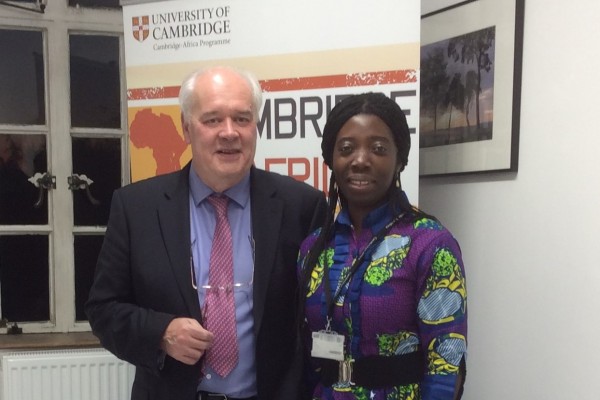History

Professor David Dunne, founding Director and Dr Pauline Essah, former Programme Manager of Cambridge-Africa
The Cambridge-Africa Programme emerged as a bottom up initiative from a number of individual, mutually-beneficial, long-term, collaborations between Cambridge and African researchers. Professor David Dunne, a parasitologist in the Department of Pathology, was the founding Director of Cambridge-Africa and served in this post from 2008 until his retirement in 2018. His inspiration for establishing Cambridge-Africa stemmed from his own collaborative research on neglected tropical diseases across Africa in long-term partnerships with many highly talented African colleagues. “They were brilliant researchers, but had neither the facilities nor resources they needed and deserved to effectively identify and deal with Africa’s challenges and make Africa’s unique contribution to the sum of global knowledge. Even the best African universities had a shortage of the well-resourced, internationally competitive, academics required to mentor the huge numbers of talented, next generation, young researchers that Africa will need to maintain and accelerate its economic progress and future well-being.” He realized that leading research-intensive universities like Cambridge were rich in exactly these resources and expertise and, therefore, could, and should, help African colleagues and institutions bridge this short and medium term mentorship gap. Cambridge-Africa was the result.
He was joined by Dr Pauline Essah in 2009, who began working as a coordinator for a scheme that linked established health researchers in Cambridge with PhD and postdoctoral level mentees in East Africa. Pauline was keen to expand the programme’s geographical and research scope. Drawing on her own personal experience as an African scholar (MPhil and PhD in Biological Science) and post-doctoral researcher in Cambridge, she wanted to not only facilitate Cambridge support for African researchers, but demonstrate that Cambridge would also gain enormously from engaging with African academia. Within a few years and with support from many colleagues in Cambridge as well as African universities and research institutes, the programme grew to encompass all subject areas — from archaeology to zoology - and span all of sub-Saharan Africa.
The programme was able to grow quickly with generous external support - competitive and philanthropic grants were won from the Wellcome Trust, Carnegie Corporation of New York and The ALBORADA Trust. Funds were also secured closer to home, from the University of Cambridge’s Isaac Newton Trust. Importantly, the funds raised were used to support research priorities in Africa, as identified by the African partners themselves. In 2015, Cambridge-Africa was adopted as the University of Cambridge’s official international strategy to support African academia across all subject areas and additional financial support was provided by the University of Cambridge and the Cambridge Trust.
In just 10 years, Cambridge-Africa could celebrate:
- Partners in 50 African Institutions across 18 countries with regional hubs in Ghana and Uganda
- A network of over 200 Cambridge collaborators
- Support for more than 40 African PhD fellows in Africa and Cambridge
- Support for 75 Africa-based postdoctoral fellows.
Thank you to David and Pauline and their many fantastic colleagues who made these achievements possible.
Read more about Cambridge-Africa’s development and achievements in the special 2017 Africa issue of Research Horizons
And see Pauline’s profile on ‘This Cambridge Life’ series.
Pauline is now the CEO of Education sub-Saharan Africa (ESSA)

